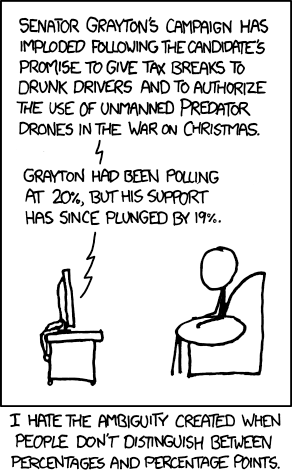Can’t believe nobody has linked the relevant xkcd yet

Which of course is why people referred to points when discussing stocks/markets. Got to love an unambiguous term.
Having two possible outcomes does not mean it’s a 50:50 chance.
“So if I aim the arrow at the 1cm square from 100m away and shoot, I either hit it or I don’t. So basically I have a 50% chance of hitting it.”
My wife, father-in-law and I were playing a board game with my brother-in-law. In this game, we were playing as detectives who have to try to find his character, but each turn he could move in secret in one of several directions. We were a few turns in at one point and he could have been in any of dozens of places at this point. We drove him nuts by saying “he’s either in this spot or he’s not, it’s a 50-50 chance.” He kept arguing “I could be in a ton of places! It’s not a 50-50 chance!” But we just kept pretending we didn’t understand and arguing that there were only two possibilities, he’s there or he’s not, so it was clearly a 50-50 chance. He got quite angry.
The thing with that is that it’s actually a useful generalization to make in a lot of scenarios.
If you know nothing about the distinction between two possible outcomes, treating them as equally likely is a helpful tool to continue with the back of the envelope guess. Knowing this path needs 5 coin tosses to go right and this one needs 10 is helpful to approximate which is better.
Your example is obviously outside the realm where you have zero information, so uniform distribution is no longer the reasonable default. But the idea is from a reasonable technique, taken to extremes by someone who doesn’t fully get it.
Very weird fun fact about arrows/darts and statistics, theres 0% chance of hitting an exact bullseye. You can hit it its possible to throw a perfect bullseye. It just has a probability of zero when mathematically analyzed due to being an infinitesimally small point. Sound like I’m making shit up? Here’s the sauce
How can an outcome both be entirely possible and have 0% probability?

Q.E.D
Key word here is “infinitesimally.” Of course if you’re calculating the odds of hitting something infinitesimally small you’re going to get 0. That’s just the nature of infinities. It is impossible to hit an infinitesimally small point, but that’s not what a human considers to be a “perfect bullseye.” There’s no paradox here.
Also the circumference of the dart tip is not infinitesimally small, so theres a definite chance of it overlapping the ‘perfect bullseye’ by hitting any number of nearby points.
Oh. That’s what they mean. That’s dumb lol.
Another lesson I the importance of significant digits, a concept I’ve had to remind many a young (and sometimes an old) engineer about. An interesting idea along similar lines is that 2 + 2 can equal 5 for significantly large values of 2.
What do you mean by significantly large
Depending on how you’re rounding, I assume. Standard rounding to whole digits states that 2.4 will round to 2 but 4.8 will round to 5. So 2.4+2.4=4.8 can be reasonably simplified to 2+2=5.
This is part of why it’s important to know what your significant digits are, because in this case the tenths digit is a bit load bearing. But, as an example, 2.43 the 3 in the hundredths digit has no bearing on our result and can be rounded or truncated.
When my son was about to be born my mother in law caught wind that we didn’t plan on circumcising (before researching it I mostly felt it was just strange to do cosmetic surgery on a newborn) but her argument was mostly parroting the 50% reduction in this that and the other disease, missing the fact that it was going from a 0.5% chance to a 0.25% chance, but of course introduced new risks by nature of being a surgery.
Naturally after looking more into it I learned just how bonkers circumcision is so I was far more cemented in my position
The fact that it is even allowed in so-called civilized countries is outrageous. In the US it common because some religious nut was obsessed with children’s masturbation.
Which is nuts, as a circumcised individual (medically necessary, my parents aren’t monsters) I masturbated A LOT as a teen.
it baffles me that anyone with a penis, or really anyone who knows what a penis actually is, would think it’s a good idea
would people remove a child’s eyelids? NO OF COURSE NOT holy shit
piercing flesh is generally to be avoided unless absolutely necessary, as is helpfully indicated to us by it being fucking painful
In game design, it has to be stated whether it’s multiplicative or additive. Sometimes a logarithmic function is used as well, with increases in efficiency as 1 / ( 1 + bonus ). This allows you to always add more bonus, but there’s diminishing returns.
i wish it was more common to also indicate the precedence of a percentage increase, so that it’s easier to know if i’m dealing with (x + y ) * z or x + (y * z). although that’s admittedly a lot harder to communicate.
Just include a glossary of formulas for figuring out stats/chances/whatever in your game. With clearly labeled variables. Then throw a reference to that glossary in your tooltips/helpful popups.
Wouldn’t it be easier for everyone to instead not add such systems? After all, don’t many go for the simple logic of bigger number is better instead of doing the math?
That’s not even a stat question, it is a english question. It is an increase by 80% not to 80%
Statistics only come to play to figure out our new chances.Funny thing is this is a language issue, not a math issue.
Why not both?
I’ve always thought of math as a language and I talk to my kids about it that way too. Math is an other way to describe the world.
It’s very different from spoken languages and translating between the two needs to be learned and practiced.
Our math education doesn’t include enough word problems and it should be bi-directional. In addition to teaching students how to write equations based of sentences we should teach them how to describe what’s going on in an equation.
It’s really pretty simple - if something increases by 80%, you add 80% of whatever it already is… one dollar becomes $1.80… one percent becomes 1.8 percent.
Most people don’t understand it because they’ve seen it done wrong so often, the wrong way seems right.
I’m quite willing to bet that 70% of the population has no clue that percentages, fractions, and decimals are the same thing.
Then odds show up to the party and upend everything we thought we understood.
That’s about 60% more than expected
huh, this feels pretty well established here in sweden: whenever people talk about stuff like elections it’s consistently percentage points
I play video games; I need to know if the percentage is additive or multiplicative.
“+100%” looks pretty good until you see what “×25%” actually gives you.
×25% gives you 1/4 the original value, whereas +100% is double the original value, let’s say 8/4 to keep it consistent. ×125% (in case a 1 is missing) is still only 5/4 the original value.
Is there a typo in your comment?
In video games they commonly use that to mean they are multiplying by 25. We know it’s not correct in stats. This is why game wikis commonly put the actual formula for things rather than the tooltip the developers wrote.
Biggest lie in a game’s tooltip/description of an item was how the formula for Armor Piercing rounds in Fallout 1 and 2 was bad, so instead of being stronger than regular rounds, they were weaker.
Games use x25% or x25? Technically the first divides the score by 4.
We are aware of what it actually does mathematically. Please re-read what I wrote.
I was asking for clarification. Do many games really add the % to x25?
Yes. Just off the top of my head, I see any kind of Diablo-like game doing it a lot. Shows everything as a percentage, but some items are just adding that number (not a percentage) or multiplying the number (also not a percentage). It’s like they just treat the % as meaning “alters number in mysterious ways.”
Warframe has a mod card will say like +200% but you don’t want that one, because it’s adding, while there is a multiplying one that will say +4, and it’s just multiplying it by 4 instead of the +200% which is only adding twice as much to the base value. If you had 100, the +200% thing gives 300. But the +4 is 400. And the way this is displayed in the game does not make sense so you’ll always think the +200% is better unless you check the wiki (or put it on your gun and play around with it).
well it’s ambiguous. Its also a sloppy way of expressing an increase by 80 percentage points.
That’s not sloppy, that’s simply wrong
I’ve always wondered how to disambiguate multiplication and addition of percentages. I guess that’s what percentage points are for?
10% of your people vote for a party.
The votes increase by 10% => now 11%
The votes increase by 200% => now 30%
The votes increased by 50 percent points => now 60%
Exactly. Unfortunately, they aren’t used widely and consistently enough. Even in the press. So you frequently have to second guess what you’re reading.










